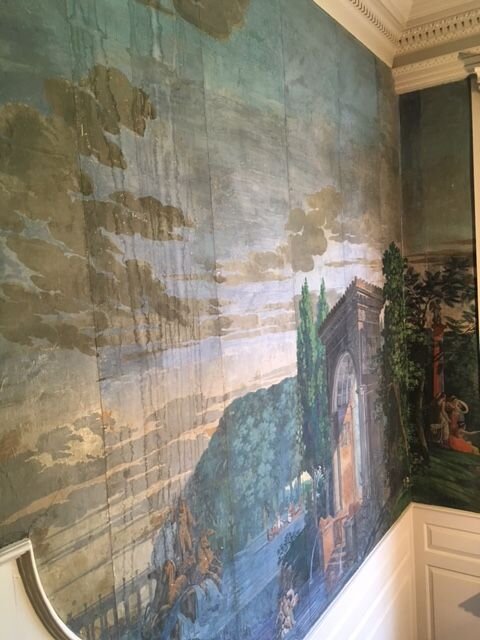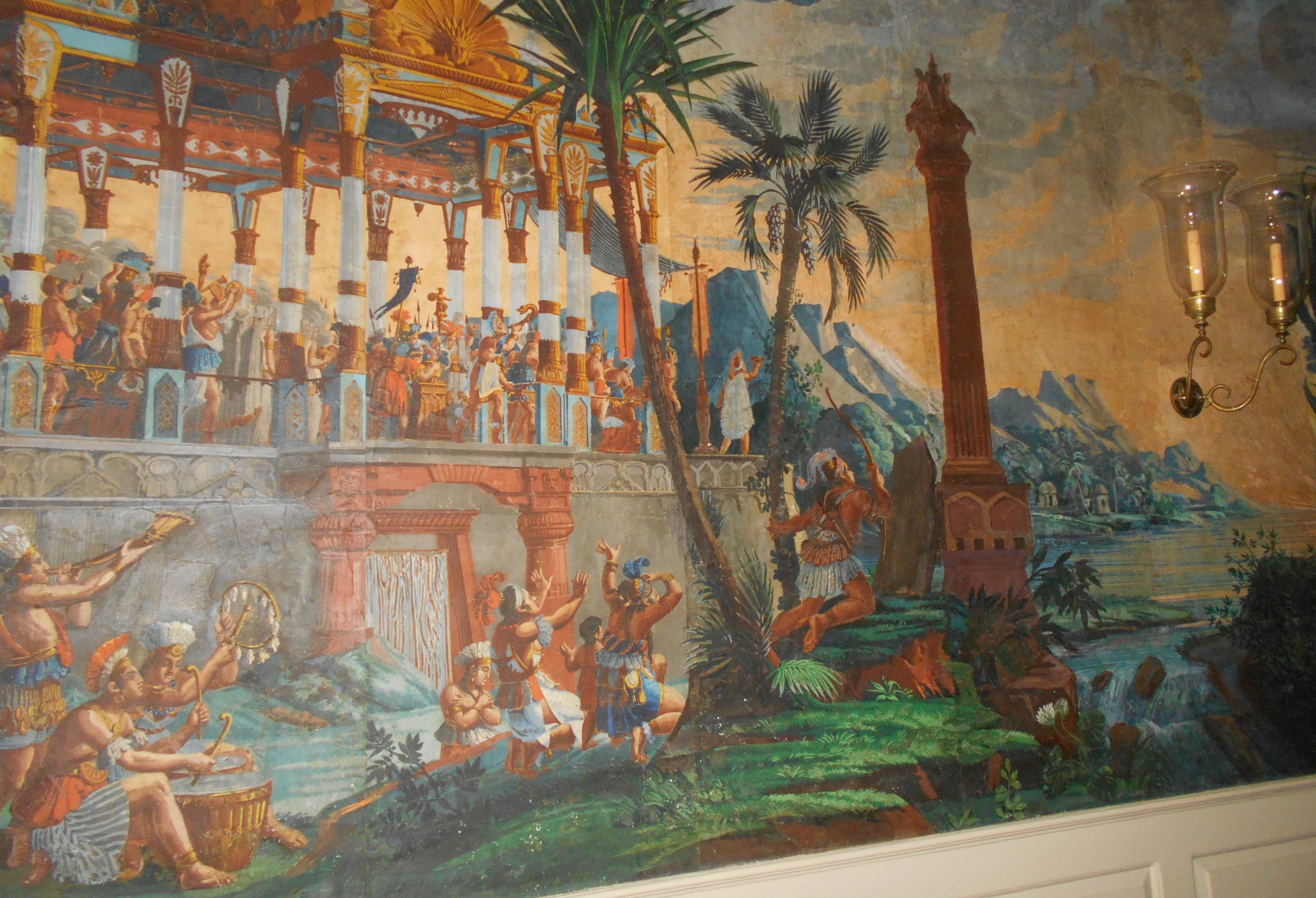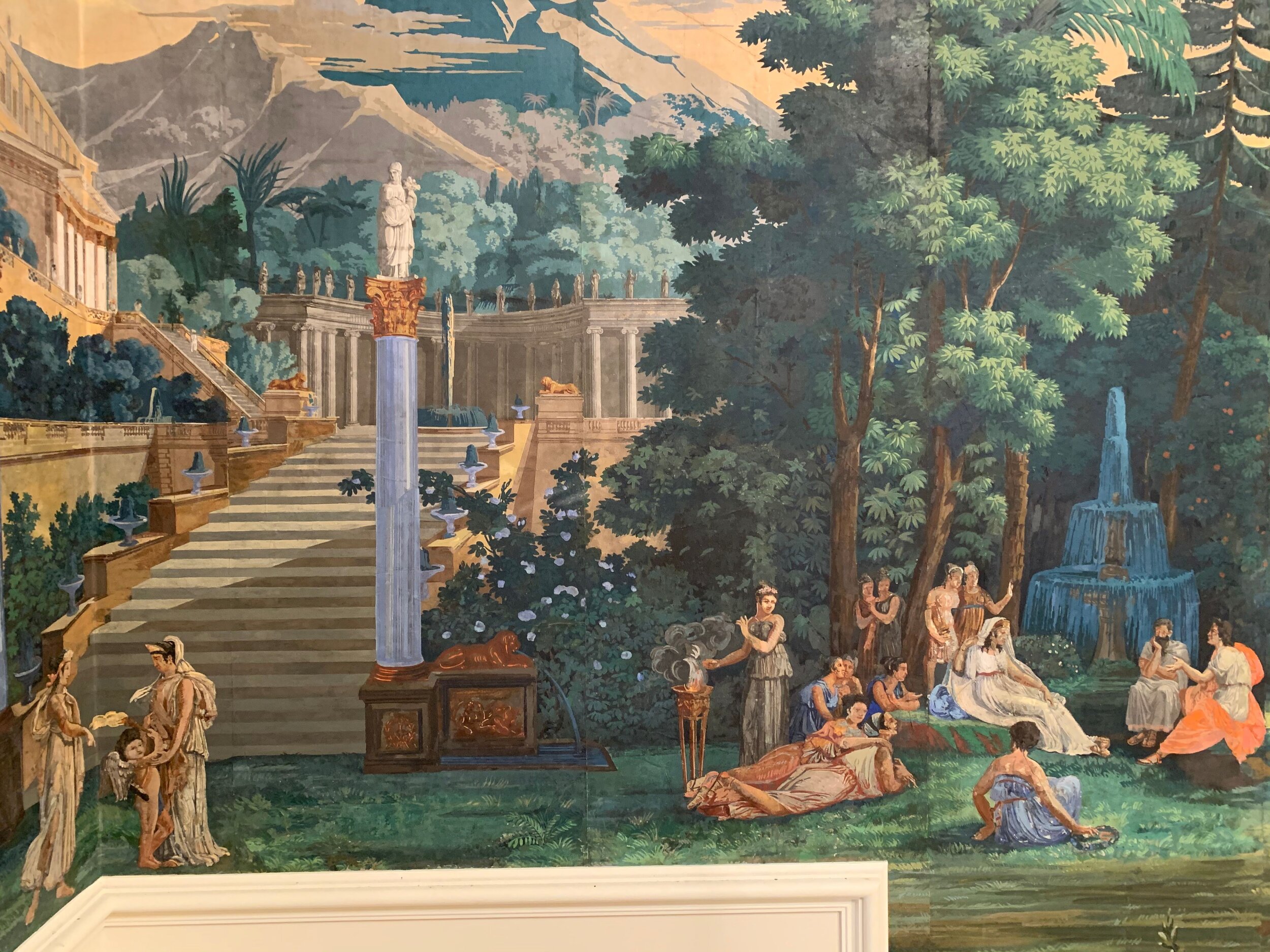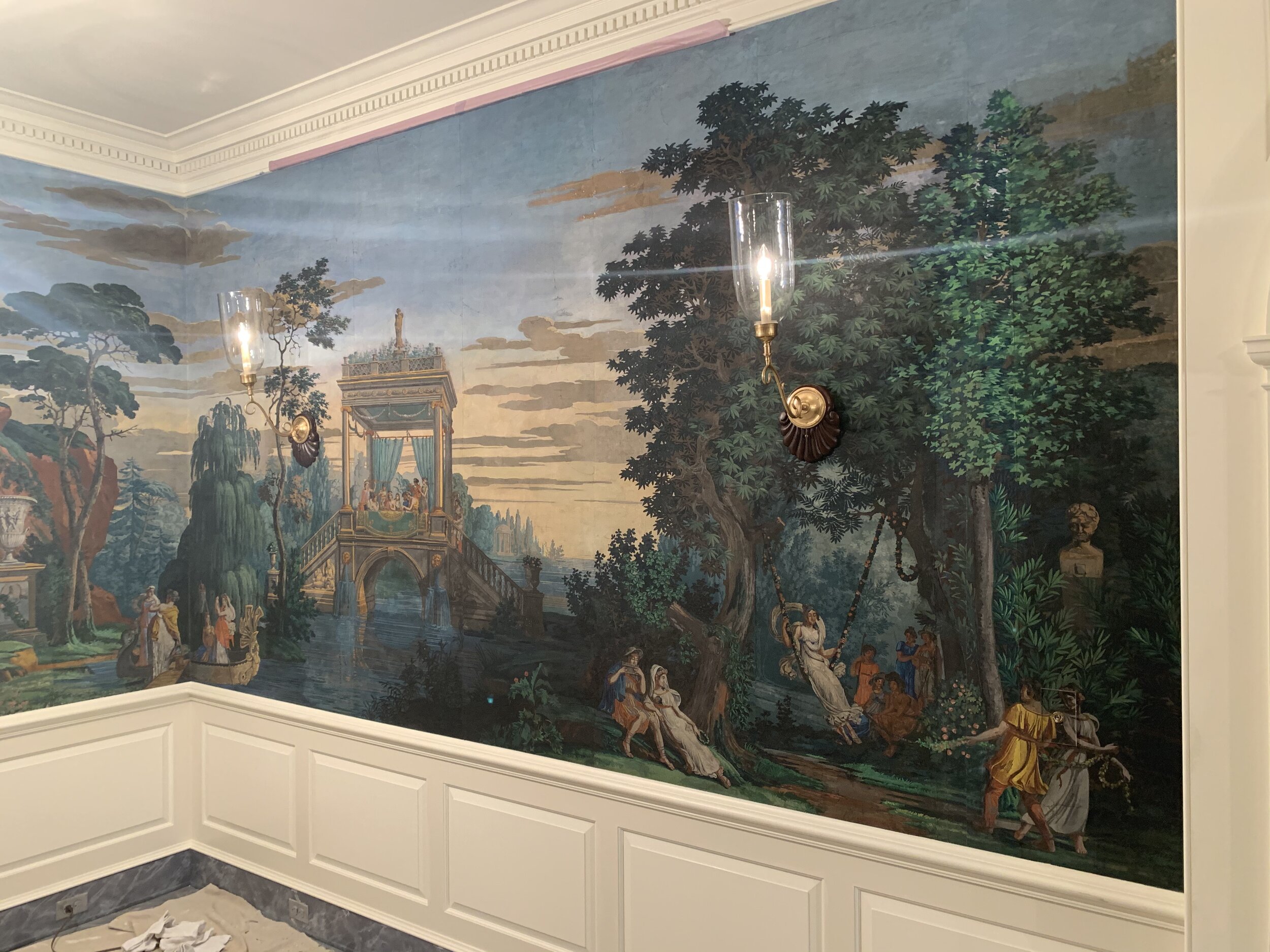Preserving rare and valuable Dufour wallpapers at the Lindens
Les Incas by Dufour (available for purchase)
History of the House
The Lindens is the oldest house in Washington, DC and was notable for its extensive antique French scenic wallpapers. Originally built in 1754 as a grand summer home in Danvers, Massachusetts, the Lindens was later dismantled, transported to Washington, DC and rebuilt there in 1937.
Original installation when the house was still in Massachusetts
The house was built for Robert “King” Hooper, a leading ship owner and merchant in Marblehead, Massachusetts. Hooper wanted an ornate summer home so as to project his wealth and social stature, but not too long after it was built, he lost his social footing when he persisted in sympathizing with the British during the run-up to the Revolutionary War. Hooper eventually lost his home to creditors and the property passed to several other owners, including one who used it as a boardinghouse.
Original installation
Original installation
Provenance of the wallpapers
Reinstalled after the house moved to Washington, DC. See 'The Incas' on the left and 'Telemaque' on the right.
Francis Peabody, Jr. bought the Lindens in 1860 and restored the home, adding three complete sets of Dufour et Leroy scenic wallpapers. The Lindens was remarkable in that it was the only remaining house with so much rare original French scenic wallpaper hung together: “Les Incas” and “Les Paysages de Telemaque dans l’IIe de Calypso” were hung in the entrance hall and up the stairs while “Les Voyages d’Anthenor” hung in the upstairs hall.
Peabody owned the Lindens for a long while and then it passed through several other hands and was poorly maintained again. The house and its valuable wallpaper was headed for demolition until it was discovered in the 1930s by a husband and wife who wanted a historic home to display their extensive collection of American antique furniture. Miriam and George Morris bought the house and hired Walter Macomber, resident architect of Colonial Williamsburg and Mount Vernon, to supervise dismantling the house in Massachusetts and rebuilding it in Washington, DC. Macomber was entirely successful in moving the house. Only a few windowpanes were damaged and the wallpaper was intact after the move.
The Incas
Les Incas
"Les Incas” c. 1832 was inspired by historian Jean Francois Marmontel’s eighteenth century account of Pizarro’s conquest of Peru in 1531. It was produced by Dufour et Leroy in 25 panels. This is another example of a successful Dufour scenic of military history in a romanticized setting, both exotic and picturesque.
Subsequent owners were encouraged to protect the Lindens’ rare and historic wallpaper and they did so. This paper has been protected for generations and has undergone only minimal repairs over the years.
Les Paysages de Telemaque dans l’Ile de Calypso
Telemaque
"Les Paysages de Telemaque dans l’IIe de Calypso” c. 1825 was created by Joseph Dufour and produced between 1815 and 1820. Twenty-five panels depict scenes from the story “Les Aventures de Telemaque” written by Francois Fenelon in 1699. It was block-printed in eighty-five colors with 2,027 woodblocks.
Dufour’s Telemaque became better known in America during the 19th century than any others of this classical group of scenic wallpapers and was hung in many important houses. Designer Xavier Mader used 85 colors to depict the voyage of the Greek hero to the island of Calpyso. Sweeping vistas of Calypso’s paradisical surroundings and of sparkling oceans provide the settings for a melodramatic representation of their romance and his escape.
Andrew Jackson also chose Telemaque for the grand entrance stair hallway of the Hermitage.
Les Voyages d’Anthenor
Anthenor
“Les Voyages d’Anthenor” c. 1814 was manufactured by Joseph Dufour by the same designer who created “Telemaque,” Xavier Mader. This paper depicts the wanderings of a Trojan prince who was spared during the siege of Troy and who later founded a city at Cyrene or Patavium.
Removal and preservation
The house recently changed hands again and the new owner reached out to Scenic Wallpaper to remove and preserve these incredible French Dufour Scenic Wallpapers. The removal experts carefully removed every individual panel following the original seams of the paper.
Individual Panels from Les Incas after removal
Reinstallation
Telemaque and Anthenor were purchased, reinstalled and restored at a home in Virginia.
"Les Incas” is still available for purchase and reinstallation. For more information, please contact Jim Francis at (212) 496-6135 or scenicwallpaper@gmail.com.
Anthenor Panels prepared for reinstallation
Before installation of the papers, the walls were prepared with a triple layer of liner paper, muslin, and liner. The muslin was installed corner to corner and top to bottom without any seams, including on the staircase. This painstaking process facilitates later removal and preservation of the wallpapers.
John and his team reinstalling Telemaque
Reinstallation of Telemaque
Reinstallation of Anthenor
Reinstallation of Telemaque
John and his team created a scale mock-up of the space prior to reinstallation of the papers. Anthenor was displayed in the entryway, flowing up the staircase to Telemaque on the second floor.
Through careful planning, they were able to place the original staircase artwork from the Lindens into the new staircase, with only minor adjustments and in-painting.
Telemaque reinstalled in the stairwell
Restoration
Cleaning sponges
After hanging, the paper was cleaned and restored. Some areas of the paper had suffered water damage or staining through the years. These were restored along with other touch-ups and in-painting to match the original artwork.
Restoration of Anthenor
Water damage before restoration
After restoration and in-painting
Before restoration
After restoration
Before restoration
After restoration
Scenic Wallpaper has an extensive library of books on antique scenics, which were referenced during the restoration to preserve the original design and artwork.
We also had access to the photos of the original installation at the Lindens when the home was located in Danvers, MA and extensive images throughout its history in Washington, DC, where the papers were written about in the Washington Post and other publications.
Telemachus, before restoration
Telemachus, after restoration
Before restoration
After restoration
Scenes from Anthenor in the entry hall, after restoration
Les Voyages d’Anthenor, after restoration
Anthenor, after restoration
Anthenor, after restoration
Telemachus in the stairwell, after restoration
Telemachus, after restoration
Telemachus, after restoration
Les Paysages de Telemaque dans l’Ile de Calypso, after restoration
See more of our Antique Wallpaper restorations here.
























































